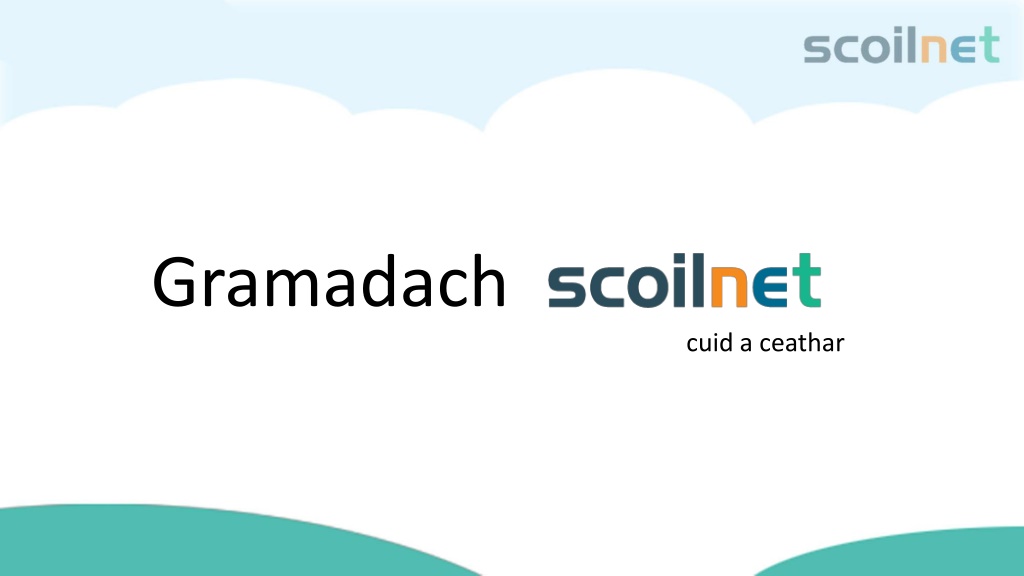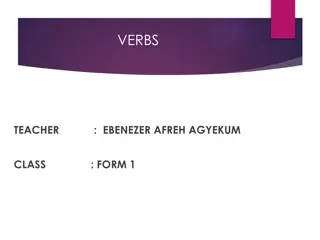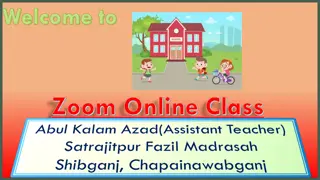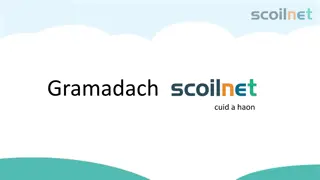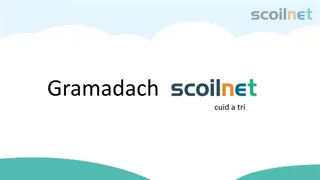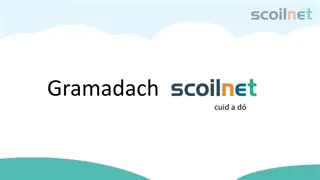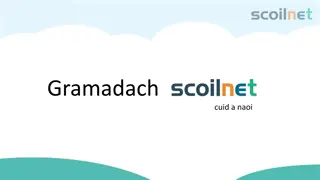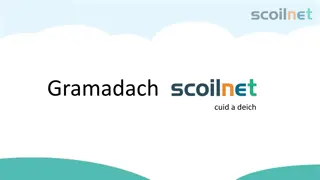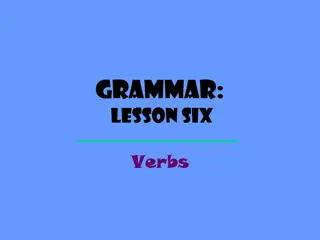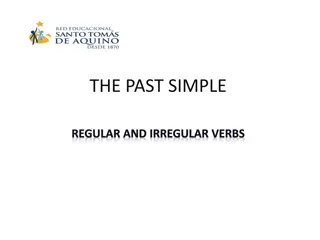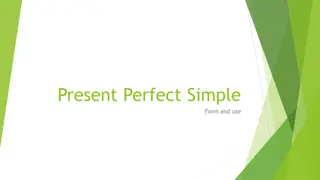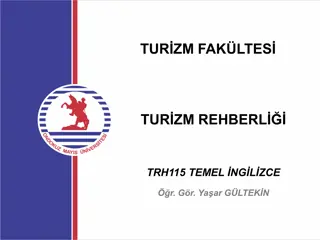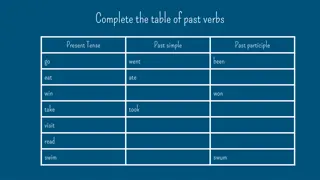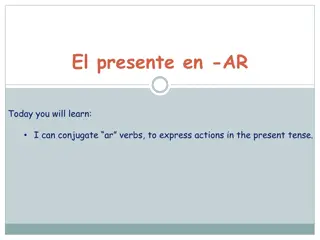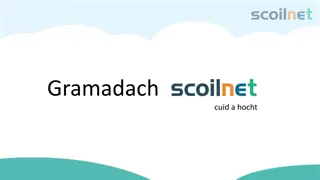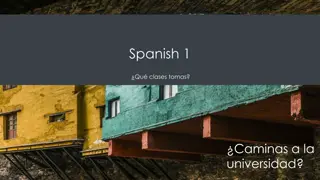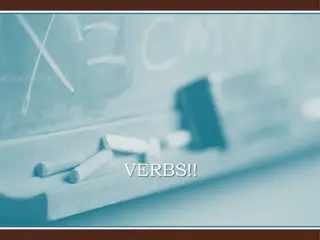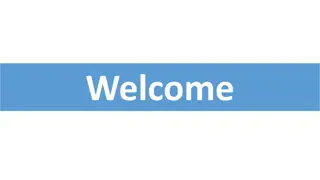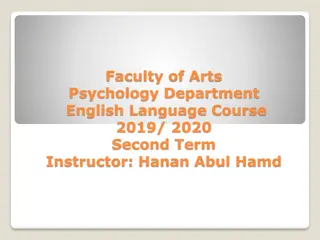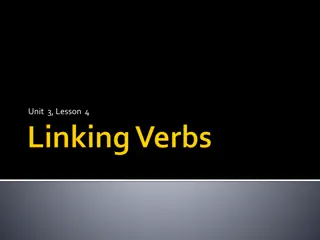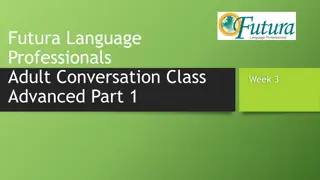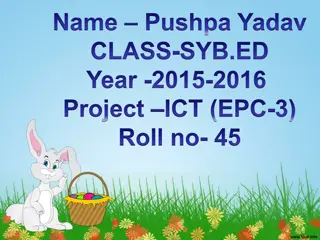Mastering Present Tense - Irish Verbs Practice Guide
Explore how to conjugate 1-syllable broad verbs in the present tense in Irish, including forming questions and negatives. Practice conjugation with examples and learn the rules for adding endings to verb roots. Enhance your understanding of everyday language use.
Download Presentation

Please find below an Image/Link to download the presentation.
The content on the website is provided AS IS for your information and personal use only. It may not be sold, licensed, or shared on other websites without obtaining consent from the author. Download presentation by click this link. If you encounter any issues during the download, it is possible that the publisher has removed the file from their server.
E N D
Presentation Transcript
Gramadach cuid a ceathar
An Aimsir Laithreach Gach L (Present Tense - Everyday) 1 syllable broad verbs 1 syllable broad verbs In the present tense, there is no need to add a h like we did in the past tense. Instead, we add an ending to the root of the verb. There are four different endings in the present tense. For 1 syllable broad verbs in the present tense, we add ann to the end of the root verb. For example Glan becomes Glanann - cleans There is no m in the present tense. Instead we add aim to the root of the verb for broad verbs. For example Glan would become Glanaim I clean The other difficult part is when we want to say we do something in the present tense. With broad verbs in the present tense, we add aimid onto the end of the stem of the verb. For example Glan becomes Glanaimid We clean
An Aimsir Laithreach Gach L (Present Tense - Everyday) 1 syllable broad verbs 1 syllable broad verbs The good news is that if a verb starts with a vowel in the present tense, the same rule still applies; just ann to the end of the root of the verb. l would become lann in the present tense. The same is true for verbs that begin with l, n or r; just add ann to the end of the root of the verb.
An Aimsir Laithreach Gach L (Present Tense - Everyday) 1 syllable broad verbs 1 syllable broad verbs Ceisteach agus Di ltach (Questions and Negative) To say that you didn t do something, we put N before the verb, h after the first letter and ann after the verb e.g. N ghlanann s . To ask a question in the present tense, we put An before and ann after the verb. We also need to put an ur before the first letter of the verb e.g. An nglanann t ? Seven letters and the vowels take an ur when you put An before it. Look at the list below. d is the ur for t ar an dteach on the house g is the ur for c ag an gcarr at the car m is the ur for b ar an mbus at the bus n is the ur for d r ndeoch our drink b is the ur for b dh bpingin two cents bh is the ur for f ar an bhfuinneog on the window n is the ur for g ar an ng ird n on the garden
An Aimsir Laithreach Gach L (Present Tense - Everyday) 1 syllable broad 1 syllable broad verbs verbs Cleachtadh - Practice ceap to think glan to clean d n to close ceapaim I think glanaim I clean d naim I close ceapann t You think glanann t You clean d nann t You close ceapann s He thinks glanann s He cleans d nann s He closes ceapann s She thinks glanann s She cleans d nann s She closes ceapaimid We think glanaimid We clean d naimid We close ceapann sibh You(pl) think glanann sibh You(pl) clean d nann sibh You (pl) close ceapann siad They think glanann siad They clean d nann siad They close An gceapann t ? Do you think? An nglanann t ? Do you clean? An nd nann t ? Do you close? N cheapaim I don t think N ghlanann s He doesn t clean N dh naim I don t close
An Aimsir Laithreach Gach L (Present Tense - Everyday) 1 syllable broad verbs 1 syllable broad verbs Quick Recap: 1. For verbs that begin with a vowel or a consonant, add ann at the end of the root verb. E.g. glan = glanann 2. There is no m in the present tense. Instead for broad verbs, we add aim to the end of the root of the verb. E.g. glan = glanaim 3. We add aimid to broad verbs in the present tense when we want to say we did something. E.g. glan = glanaimid 4. To ask a question, we use An, an ur and ann. To say the negative, we use N , a s imhi (h) and ann.
